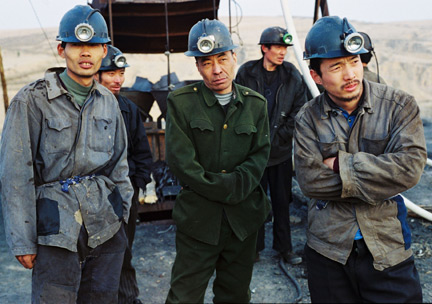The film, a debut effort from writer/director/producer/editor Yang Li, examines the corruption and moral erosion that takes place amid the lowest rungs of the poverty-stricken. A mixture of American film noir and Italian neorealism, Blind Shaft is as searing an indictment of modern China as any to emerge from the region in recent memory.
Song Jinming (Li Yi Xiang) and Tang Zhaoyang (Wang Shuangbao) are a couple of seemingly cold-hearted con men. Their preferred M.O. is to recruit some poor sucker and drag him along to their job in one of China's thousands of poorly regulated private coal mines. After a week or so, the duo bump off their new friend with a convenient “accident” and extort money from the mine owners, claiming to be relatives of the deceased.
Mind you, the mine owners are no paragons of virtue either. One particular victim contemplates whacking the bereaved “brother,” only to come to the conclusion that buying off the local cops for a murder rap is the more expensive of his options.
One day, while moving their deadly operation on to a new town, the men encounter a naïve 16-year-old named Yuan Fengming (Wang Baoqiang) who's trying to earn money for school. He seems like the perfect patsy, although Song expresses a reservation or two regarding the kid's youth. Despite the misgivings, Yuan is drafted and taken along to the nearest mine. Will Song and Tang really sacrifice this lost little lamb when the time comes?
Blind Shaft treats its characters much like the world around them does–as disposable commodities. “China lacks everything,” points out one cynical mine owner. “The only thing it doesn't lack is people.” Sympathy is in short supply here, and Song and Tang hardly qualify as heroes. The script gives viewers very little information about these characters or their backgrounds, but tiny bits begin to leak out. Song has a son of his own and laments spending his ill-gotten gains on booze and prostitutes when he could be sending the money home. As time goes by, he finds more and more excuses to delay Yuan's murder by “just one more day.”
The film moves slowly, spending as much time exploring the harsh, postindustrial environment as poking into the cruel machinations of mankind. There is also a conspicuous absence of music, which further heightens the film's sense of chilly isolation and quiet tension. Blind Shaft hardly qualifies as a thriller, but–at a mere 92 minutes–this economical morality play of greed and desperation rarely allows interest to wander. Gritty, coal-black and filled with crafty social commentary, Blind Shaft is proof that there isn't always light at the end of the tunnel.



